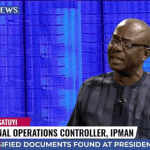For many years Nigeria’s four refineries have failed to function to its optimum capacity meaning that Nigeria has solely relied on the exportation of crude oil and importation of refined product costing Nigeria, One of the leading producers of crude, billions of naira.
This action has been frowned upon by many state players describing it as wasteful and encouraging the federal government to restore the refineries to full functionality, a task that has so far proven difficult to accomplish as despite the huge sums allocated for turnaround maintenance, the country’s refineries remain comatose.
This perhaps is why the federal government is considering privatizing the refineries a decision strongly being kicked against by the Petroleum and Natural Gas Senior Staff Association of Nigeria, Pengassan saying they oppose all plans to sell off the refineries, they want the federal government to tread cautiously and rather fix the refineries insisting that

it would greatly benefit government if its policies are channeled towards infrastructure development of the oil and gas industry.
Speaking on TVCBreafast, national operations controller of the independent petroleum marketers Association of Nigeria, IPMAN, Mike Osatuyi said privatising the refineries makes it easy to manage and out of government control, maximise operations and reduce cost.
Mr Osatuyi also noted that all the huge funds spent on reviving the refineries in time past has failed.
He said if government channels the excess income we would be getting from deregulation and invest it judiciously, which will be beneficial to Nigerians.
He said “If the refineries of other countries can work, why is that of Nigeria not working.
“Between 2016 and 2020 we have spent about 1.6 trillion on the maintenance of moribund refineries.
Mr Osatuyi stated further that the excess funds that would be gotten from the deregulation can be channeled into making other sectors better such as healthcare, good roads and others.
He also said this will make for accountability as Nigerians would know what the excess funds are being used for.
He added that with the Dangote refinery coming on board, would change the chemistry of the oil business.
For many years Nigeria’s four refineries have failed to function to its optimum capacity meaning that Nigeria has solely relied on the exportation of crude oil and importation of refined product costing Nigeria, One of the leading producers of crude, billions of naira.
This action has been frowned upon by many state players describing it as wasteful and encouraging the federal government to restore the refineries to full functionality, a task that has so far proven difficult to accomplish as despite the huge sums allocated for turnaround maintenance, the country’s refineries remain comatose.
This perhaps is why the federal government is considering privatizing the refineries a decision strongly being kicked against by the Petroleum and Natural Gas Senior Staff Association of Nigeria, Pengassan saying they oppose all plans to sell off the refineries, they want the federal government to tread cautiously and rather fix the refineries insisting that

it would greatly benefit government if its policies are channeled towards infrastructure development of the oil and gas industry.
Speaking on TVCBreafast, national operations controller of the independent petroleum marketers Association of Nigeria, IPMAN, Mike Osatuyi said privatising the refineries makes it easy to manage and out of government control, maximise operations and reduce cost.
Mr Osatuyi also noted that all the huge funds spent on reviving the refineries in time past has failed.
He said if government channels the excess income we would be getting from deregulation and invest it judiciously, which will be beneficial to Nigerians.
He said “If the refineries of other countries can work, why is that of Nigeria not working.
“Between 2016 and 2020 we have spent about 1.6 trillion on the maintenance of moribund refineries.
Mr Osatuyi stated further that the excess funds that would be gotten from the deregulation can be channeled into making other sectors better such as healthcare, good roads and others.
He also said this will make for accountability as Nigerians would know what the excess funds are being used for.
He added that with the Dangote refinery coming on board, would change the chemistry of the oil business.
For many years Nigeria’s four refineries have failed to function to its optimum capacity meaning that Nigeria has solely relied on the exportation of crude oil and importation of refined product costing Nigeria, One of the leading producers of crude, billions of naira.
This action has been frowned upon by many state players describing it as wasteful and encouraging the federal government to restore the refineries to full functionality, a task that has so far proven difficult to accomplish as despite the huge sums allocated for turnaround maintenance, the country’s refineries remain comatose.
This perhaps is why the federal government is considering privatizing the refineries a decision strongly being kicked against by the Petroleum and Natural Gas Senior Staff Association of Nigeria, Pengassan saying they oppose all plans to sell off the refineries, they want the federal government to tread cautiously and rather fix the refineries insisting that

it would greatly benefit government if its policies are channeled towards infrastructure development of the oil and gas industry.
Speaking on TVCBreafast, national operations controller of the independent petroleum marketers Association of Nigeria, IPMAN, Mike Osatuyi said privatising the refineries makes it easy to manage and out of government control, maximise operations and reduce cost.
Mr Osatuyi also noted that all the huge funds spent on reviving the refineries in time past has failed.
He said if government channels the excess income we would be getting from deregulation and invest it judiciously, which will be beneficial to Nigerians.
He said “If the refineries of other countries can work, why is that of Nigeria not working.
“Between 2016 and 2020 we have spent about 1.6 trillion on the maintenance of moribund refineries.
Mr Osatuyi stated further that the excess funds that would be gotten from the deregulation can be channeled into making other sectors better such as healthcare, good roads and others.
He also said this will make for accountability as Nigerians would know what the excess funds are being used for.
He added that with the Dangote refinery coming on board, would change the chemistry of the oil business.
For many years Nigeria’s four refineries have failed to function to its optimum capacity meaning that Nigeria has solely relied on the exportation of crude oil and importation of refined product costing Nigeria, One of the leading producers of crude, billions of naira.
This action has been frowned upon by many state players describing it as wasteful and encouraging the federal government to restore the refineries to full functionality, a task that has so far proven difficult to accomplish as despite the huge sums allocated for turnaround maintenance, the country’s refineries remain comatose.
This perhaps is why the federal government is considering privatizing the refineries a decision strongly being kicked against by the Petroleum and Natural Gas Senior Staff Association of Nigeria, Pengassan saying they oppose all plans to sell off the refineries, they want the federal government to tread cautiously and rather fix the refineries insisting that

it would greatly benefit government if its policies are channeled towards infrastructure development of the oil and gas industry.
Speaking on TVCBreafast, national operations controller of the independent petroleum marketers Association of Nigeria, IPMAN, Mike Osatuyi said privatising the refineries makes it easy to manage and out of government control, maximise operations and reduce cost.
Mr Osatuyi also noted that all the huge funds spent on reviving the refineries in time past has failed.
He said if government channels the excess income we would be getting from deregulation and invest it judiciously, which will be beneficial to Nigerians.
He said “If the refineries of other countries can work, why is that of Nigeria not working.
“Between 2016 and 2020 we have spent about 1.6 trillion on the maintenance of moribund refineries.
Mr Osatuyi stated further that the excess funds that would be gotten from the deregulation can be channeled into making other sectors better such as healthcare, good roads and others.
He also said this will make for accountability as Nigerians would know what the excess funds are being used for.
He added that with the Dangote refinery coming on board, would change the chemistry of the oil business.
For many years Nigeria’s four refineries have failed to function to its optimum capacity meaning that Nigeria has solely relied on the exportation of crude oil and importation of refined product costing Nigeria, One of the leading producers of crude, billions of naira.
This action has been frowned upon by many state players describing it as wasteful and encouraging the federal government to restore the refineries to full functionality, a task that has so far proven difficult to accomplish as despite the huge sums allocated for turnaround maintenance, the country’s refineries remain comatose.
This perhaps is why the federal government is considering privatizing the refineries a decision strongly being kicked against by the Petroleum and Natural Gas Senior Staff Association of Nigeria, Pengassan saying they oppose all plans to sell off the refineries, they want the federal government to tread cautiously and rather fix the refineries insisting that

it would greatly benefit government if its policies are channeled towards infrastructure development of the oil and gas industry.
Speaking on TVCBreafast, national operations controller of the independent petroleum marketers Association of Nigeria, IPMAN, Mike Osatuyi said privatising the refineries makes it easy to manage and out of government control, maximise operations and reduce cost.
Mr Osatuyi also noted that all the huge funds spent on reviving the refineries in time past has failed.
He said if government channels the excess income we would be getting from deregulation and invest it judiciously, which will be beneficial to Nigerians.
He said “If the refineries of other countries can work, why is that of Nigeria not working.
“Between 2016 and 2020 we have spent about 1.6 trillion on the maintenance of moribund refineries.
Mr Osatuyi stated further that the excess funds that would be gotten from the deregulation can be channeled into making other sectors better such as healthcare, good roads and others.
He also said this will make for accountability as Nigerians would know what the excess funds are being used for.
He added that with the Dangote refinery coming on board, would change the chemistry of the oil business.
For many years Nigeria’s four refineries have failed to function to its optimum capacity meaning that Nigeria has solely relied on the exportation of crude oil and importation of refined product costing Nigeria, One of the leading producers of crude, billions of naira.
This action has been frowned upon by many state players describing it as wasteful and encouraging the federal government to restore the refineries to full functionality, a task that has so far proven difficult to accomplish as despite the huge sums allocated for turnaround maintenance, the country’s refineries remain comatose.
This perhaps is why the federal government is considering privatizing the refineries a decision strongly being kicked against by the Petroleum and Natural Gas Senior Staff Association of Nigeria, Pengassan saying they oppose all plans to sell off the refineries, they want the federal government to tread cautiously and rather fix the refineries insisting that

it would greatly benefit government if its policies are channeled towards infrastructure development of the oil and gas industry.
Speaking on TVCBreafast, national operations controller of the independent petroleum marketers Association of Nigeria, IPMAN, Mike Osatuyi said privatising the refineries makes it easy to manage and out of government control, maximise operations and reduce cost.
Mr Osatuyi also noted that all the huge funds spent on reviving the refineries in time past has failed.
He said if government channels the excess income we would be getting from deregulation and invest it judiciously, which will be beneficial to Nigerians.
He said “If the refineries of other countries can work, why is that of Nigeria not working.
“Between 2016 and 2020 we have spent about 1.6 trillion on the maintenance of moribund refineries.
Mr Osatuyi stated further that the excess funds that would be gotten from the deregulation can be channeled into making other sectors better such as healthcare, good roads and others.
He also said this will make for accountability as Nigerians would know what the excess funds are being used for.
He added that with the Dangote refinery coming on board, would change the chemistry of the oil business.
For many years Nigeria’s four refineries have failed to function to its optimum capacity meaning that Nigeria has solely relied on the exportation of crude oil and importation of refined product costing Nigeria, One of the leading producers of crude, billions of naira.
This action has been frowned upon by many state players describing it as wasteful and encouraging the federal government to restore the refineries to full functionality, a task that has so far proven difficult to accomplish as despite the huge sums allocated for turnaround maintenance, the country’s refineries remain comatose.
This perhaps is why the federal government is considering privatizing the refineries a decision strongly being kicked against by the Petroleum and Natural Gas Senior Staff Association of Nigeria, Pengassan saying they oppose all plans to sell off the refineries, they want the federal government to tread cautiously and rather fix the refineries insisting that

it would greatly benefit government if its policies are channeled towards infrastructure development of the oil and gas industry.
Speaking on TVCBreafast, national operations controller of the independent petroleum marketers Association of Nigeria, IPMAN, Mike Osatuyi said privatising the refineries makes it easy to manage and out of government control, maximise operations and reduce cost.
Mr Osatuyi also noted that all the huge funds spent on reviving the refineries in time past has failed.
He said if government channels the excess income we would be getting from deregulation and invest it judiciously, which will be beneficial to Nigerians.
He said “If the refineries of other countries can work, why is that of Nigeria not working.
“Between 2016 and 2020 we have spent about 1.6 trillion on the maintenance of moribund refineries.
Mr Osatuyi stated further that the excess funds that would be gotten from the deregulation can be channeled into making other sectors better such as healthcare, good roads and others.
He also said this will make for accountability as Nigerians would know what the excess funds are being used for.
He added that with the Dangote refinery coming on board, would change the chemistry of the oil business.
For many years Nigeria’s four refineries have failed to function to its optimum capacity meaning that Nigeria has solely relied on the exportation of crude oil and importation of refined product costing Nigeria, One of the leading producers of crude, billions of naira.
This action has been frowned upon by many state players describing it as wasteful and encouraging the federal government to restore the refineries to full functionality, a task that has so far proven difficult to accomplish as despite the huge sums allocated for turnaround maintenance, the country’s refineries remain comatose.
This perhaps is why the federal government is considering privatizing the refineries a decision strongly being kicked against by the Petroleum and Natural Gas Senior Staff Association of Nigeria, Pengassan saying they oppose all plans to sell off the refineries, they want the federal government to tread cautiously and rather fix the refineries insisting that

it would greatly benefit government if its policies are channeled towards infrastructure development of the oil and gas industry.
Speaking on TVCBreafast, national operations controller of the independent petroleum marketers Association of Nigeria, IPMAN, Mike Osatuyi said privatising the refineries makes it easy to manage and out of government control, maximise operations and reduce cost.
Mr Osatuyi also noted that all the huge funds spent on reviving the refineries in time past has failed.
He said if government channels the excess income we would be getting from deregulation and invest it judiciously, which will be beneficial to Nigerians.
He said “If the refineries of other countries can work, why is that of Nigeria not working.
“Between 2016 and 2020 we have spent about 1.6 trillion on the maintenance of moribund refineries.
Mr Osatuyi stated further that the excess funds that would be gotten from the deregulation can be channeled into making other sectors better such as healthcare, good roads and others.
He also said this will make for accountability as Nigerians would know what the excess funds are being used for.
He added that with the Dangote refinery coming on board, would change the chemistry of the oil business.













